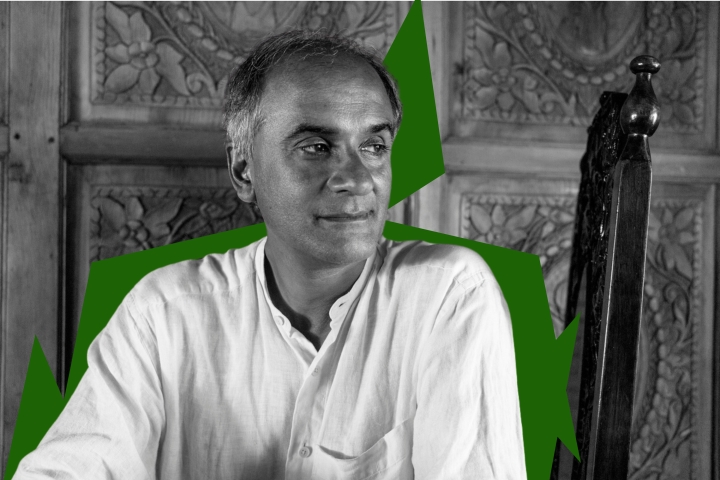The writer Pico Iyer will return to campus on Sept. 23 to begin a three-week residency as a Montgomery Fellow.
Previously a Montgomery Fellow in the fall of 2022, Iyer has devoted his career to probing what it means to live a full, honorable life, the riddles of religious and spiritual faith, and what drives human beings to find meaning and make connections across culture and life experience.
That pursuit has taken him to Nepal, Sri Lanka, India, and Iran, among other countries, a journey described in his most recently published book The Half Known Life: In Search of Paradise, which was named one of 2023’s Best Books by The New York Times and The New Yorker. He has also written about his decades-long friendship with the Dalai Lama.
“I’ve always been alert to the fascination of the other, wherever I am coming from. I am drawn to uncomfortable, uneasy places just to remind myself how little I know,” Iyer says.
Iyer was born in England to Indian parents and moved to California when he was seven; his parents were both scholars at the University of California, Santa Barbara, and Iyer still owns a house there. After receiving his undergraduate degree at Oxford University, Iyer did graduate study at Harvard.
He divides his time between California and Kyoto, Japan, where has lived for 37 years with his wife Hiroko Takeuchi.
Sienna Craig, a professor of anthropology and the Jane & Raphael Bernstein Professor in Asian Studies, grew up in Santa Barbara. She first met Iyer when she was 18, about to embark on her own first journey to Nepal. Iyer has remained an inspiration and mentor to her over three decades.
She nominated Iyer for his first Montgomery Fellowship. To Craig, Iyer “embodies the best elements of a public intellectual and a compassionate and creative thinker. He has a way of reflecting on and being in the world that I recognized would be very valuable to our community.”
While on campus, Iyer will be visiting various classes and will be engaging in a series of conversations through all six house communities, and participating in a dinner and discussion with a delegation of monastics from the Blue Cliff Monastery, a mindfulness practice center in the tradition of Vietnamese Buddhist teacher Thich Nhat Hanh. The monastics will also be in residence during Iyer’s fellowship.
He also plans to give a talk at Dartmouth on Tuesday, Oct. 1, at 4:30 p.m. in Loew Auditorium on The World Beyond Our Screens.
It is self-evident what a writer of 17 books, both fiction and nonfiction, who has been published in the New York Times, The New York Review of Books, Harper’s and Granta, can offer students in the way of insight and reflection, but what do they offer him?
“Hope,” Iyer says. “And freshness and vitality and real excitement.”
He is struck, he says, by the maturity and intellect of this generation of college students. They are global citizens, with a global outlook. And engaging with a broad range of students on campus for three weeks is something he doesn’t often have a chance to experience, he says.
When Steve Swayne, the director of the Montgomery Fellows program and Jacob H. Strauss 1922 Professor of Music, thought about inviting back a previous fellow, Iyer leapt to mind. Swayne cites Iyer’s “care and concern he has for the people around him as he is witnessing a world that many of us just don’t take the time to see.”
Iyer, who has also given four TED talks that have together drawn more than 11 million viewers, says the daily news headlines that cross his desk tend to be despairing, even cataclysmic.
But, Iyer observes, “As soon as I enter a classroom I’m flooded with the complement to all that, which is these extremely bright young people who really do see the whole world as their neighborhood. They are bringing this attention, energy and resources that I couldn’t have imagined while we were in college, to our problems.”
It’s all too easy to be sucked into a digital vortex but Iyer resists. He does not own a cell phone, and his email server dates from digital communications’ infancy; he writes in longhand and tries “to pass the first five hours of each day at my desk without a computer in the same room.”
He is so comfortable with solitude and the idea of asking but not necessarily getting answers that he regularly visits a Benedictine monastery in Big Sur, California, the subject of a new book, Aflame: Learning from Silence, which will be released in January.
“My fear is that in the age of information, we have more and more the illusion of knowledge because we can see everywhere on screen. What we’re missing is the most important third dimension, which is the human reality of it,” Iyer says.
Two previous Montgomery Fellows will also be returning to campus for engagements during Iyer’s residency.
David Silbersweig ’82, the chair of the Department of Psychiatry at the Brigham and Women’s Hospital/Harvard Medical School, who co-moderated a conversation with Iyer in 2022, will join Iyer for a discussion at 4:30 p.m. on Wednesday, Oct. 9, in Rockefeller 001.
And Los Angeles artist Enrique Martínez Celaya will give a talk at the Hood Museum of Art on Sept. 27 in conjunction with The Grief of Almost, an exhibition of his work that runs at the museum through April 6.
